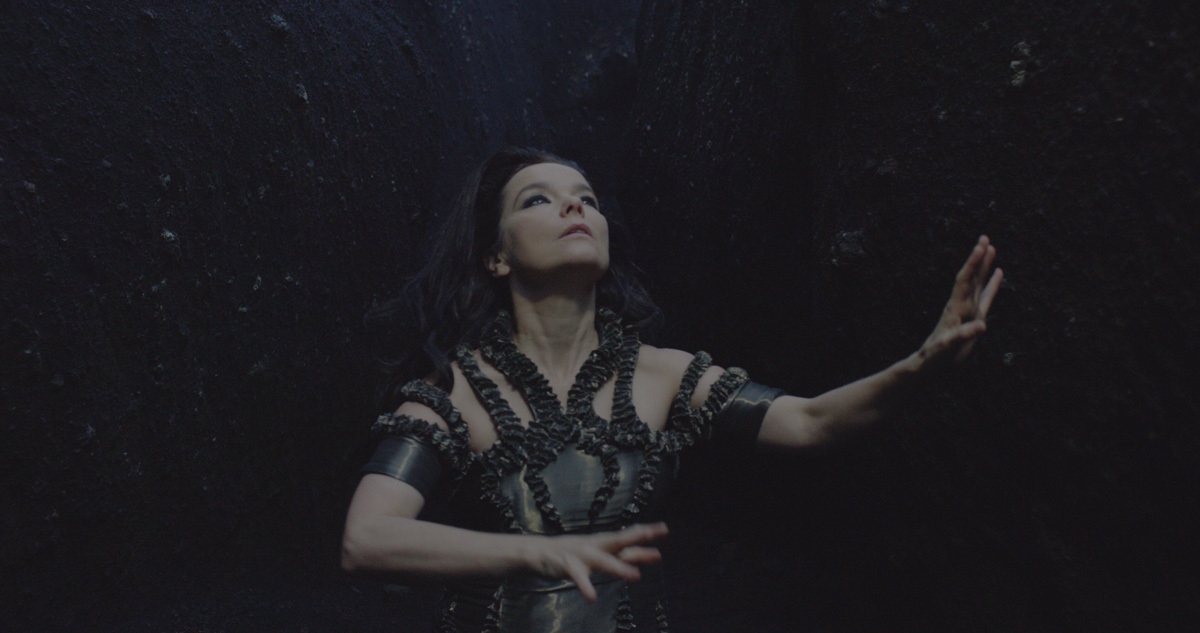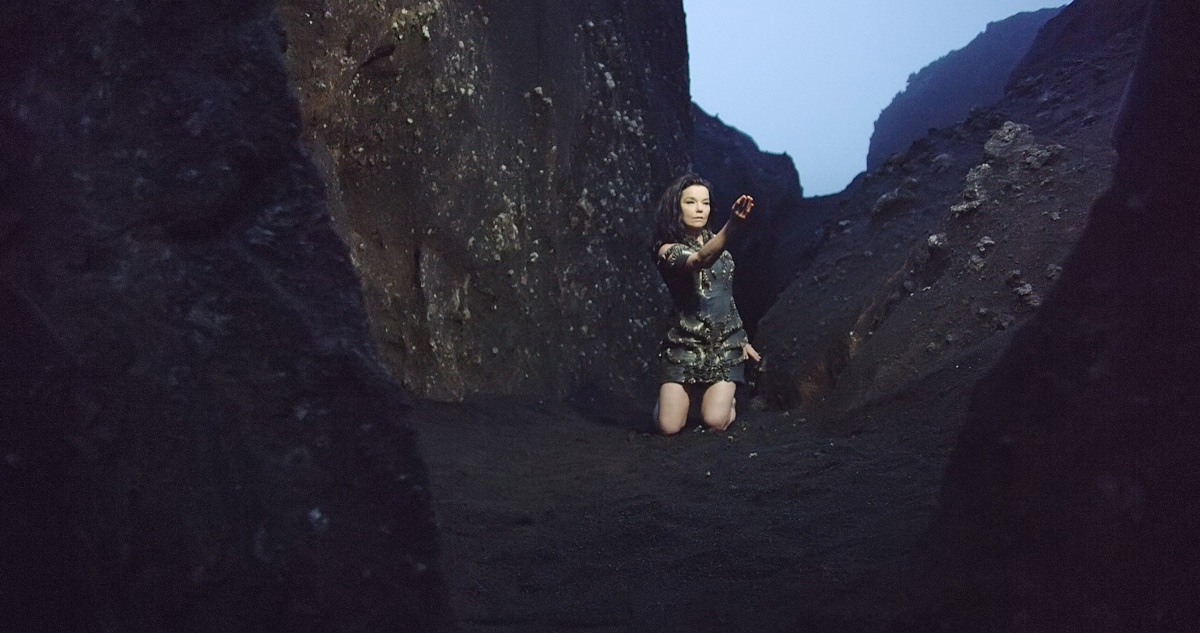A creative partner is one of the best things you can come across. They give your ideas the traction and permission to run wild and make their way into real life; finishing your creative sentences both literally and figuratively. James Merry met Björk seven years ago when he heard that the iconic musician was after an assistant and dropped her an email. Bonding over a shared interest in mysterious globsters – the name given to an unidentified organic mass that washes up on an ocean shoreline – they were soon firm friends and began collaborating creatively.
It is their shared love of nature that binds them above all, with James’ beautiful embroidery now a familiar sight on Björk’s collection of moth-inspired masks, as well as across his sportswear pieces, their logos overgrown with wildflowers and Icelandic moss. Vulnicura, Björk’s deeply moving “old fashioned heartbreak saga” of an album, though a very human body of work, was accompanied by stunning natural visuals shot on Iavafields and inside caves; a celebration of the immense natural beauty of her homeland. Giving a home to these VR videos, she and Merry teamed up to creative director the immersive Björk: Digital exhibition open at London’s Somerset House, appearing at the press conference via live stream motion capture avatar from Iceland, wearing a CGI version of one of his masks.
Björk spoke, quite rightly, of technology enabling women to work outside the already formed hierarchical systems. “The laptop arriving in 1999 gave me a personal studio to make Vespertine,” she shared, “the touchscreen in 2006 helped me map my own idiosyncratic musicology outside the classical canon and reconnect it with nature and make Biophilia. VR is helping making a new stage free of politics where sound and vision is swirling free in 360 fully liberated.” The exhibition begins with the MOMA-commissioned, Andrew Thomas Huang-directed Black Lake before the audience are invited to move through the space to join Björk on a remote beach for Stonemilker and shrink down Magic School Bus-style to explore the singer’s Mouthmantra. In Notget, by Warren Du Preez and Nick Thornton Jones, she becomes a moth giantess and everything is quite magical. Completely under their collective spell, we caught up with the wonderful James Merry.

Hello James. How did you and Björk meet? Do you remember your first conversation?
Björk and I started emailing each other back in 2009. I was living in London at the time, and was introduced to her just as she was starting research for Biophilia and looking for a new assistant. I remember sending her some really weird links to stuff I was into at the time: ornithomancy and globsters, if I remember correctly. After a few of these emails, I flew out to meet her in New York and we had breakfast. I remember being so nervous on the way there, but the second we met it just felt really natural and we spent the day chatting and showing each other our favourite youtube links. I went back to London and about two weeks later moved out to work with full time with her… and have been here ever since!
What prompted the initial idea for Björk: Digital?
The Björk: Digital show was initially conceived to give a home to all the new VR videos for Vulnicura. Most people still don’t have private access to headsets or hardware, so it was more about offering a space to come and try it out – along with the a chance to see the other elements on show (Biophilia app, Cinema room and Black Lake installation). For a lot of visitors, it’s their first experience of virtual reality and that has been really cool to witness.
Which VR video was the most fun to create?
Stonemilker was particularly fun as it was the first time we shot in 360, and we were all discovering it’s strengths and weaknesses and how exactly it worked. Everyone on set had to hide behind the big rocks on the beach while Björk was performing, as the camera is essentially pointed in every direction. It was an odd feeling at the end of a whole day shooting, we all clapped and cheered before realising that no-one else but Björk had seen a second of the performance captured.
Which is your favourite to experience?
One of my favourite parts of Vulnicura VR now is actually the main menu area, the hub from where you can select the different videos. This hasn’t been released or shown at an exhibition yet, but I love the setting (you are on a mossy Icelandic lavafield) and it’s just a really beautiful and relaxing place to hang out in between all the different videos. Plus it has a cool VR embroidery navigation feature, that I obviously really enjoy…

Was the decision to add additional videos with each destination a practical decision or creative?
Probably a bit of both – it made sense both practically and creatively. This aspect of the show is one of the most exciting to me – that people can get a window into the process, and see these works in progress develop as the exhibition travels and technology develops. It’s probably quite an honest reflection of where VR is at right now – things are changing really quick and it’s a new frontier. Each video we have made ends up using some new technology that wasn’t available with the previous one. Plus it gives each venue it’s own premiere, and keeps the content of the show fresh.
What can you tell us about the coming video for Family?
It’s directed by Andrew Thomas Huang with additional co-creative direction by Björk and myself. I’m not sure how much more I can say about it right now, we will be announcing more details soon!
As VR continues to develop, how do you envisage it integrating further into the worlds of art and music?
The ability to place sound spatially is really exciting and the potential for performance is endless. As a gamer, I’m probably most excited by the new games that are already coming out (I just played Longbow on The Lab for 30 minutes and totally lost myself). But for films too – I’m just waiting for a director to make a proper scary / beautiful movie in VR…
How can we keep things intimate and organic while using such technologies?
As with any other medium, the true quality of the experience will be down to the emotional content of the piece. It’s the artists and directors who have to put the spontaneity and fertility into the devices, not the other way around. I have faith that there will always be some people making interesting and organic stuff, no matter the medium or technology.

You’re simultaneously working with both very traditional and futuristic mediums in your art. Do you worry that at some point older crafts – such as embroidery – will be forgotten as technology moves even further forward?
I never considered traditional craft and new technology as posing a threat to each other – quite the opposite actually. New technology has allowed me to live in the countryside and work as a hand embroiderer – something I couldn’t have done 10 years ago. I can live and work halfway up a remote mountain in Iceland, and upload my work to Instagram in a second. I think there’s an almost archetypal quality to embroidery that means it will always be around – and we shouldn’t be afraid to re-imagine it over and over again as technology develops. I’ve been trying to embroider with/onto quite modern & contemporary materials, as I just personally love the clash between something so ancient and domestic with something a bit more futuristic and urban. It hasn’t escaped my notice that words traditionally associated with embroidery now permeate the language of all things digital and online – email threads, the web, the net, video editors stitch together footage… The two worlds can support and influence each other in a really exciting and healthy way.
I see that you’ve been in Japan recently. What did you discover on the trip?
Yeah, we were so lucky to spend a whole month in Japan this year while we launched Björk: Digital in Tokyo and shot a new VR video for Quicksand. Going to Yakushima for the first time was probably a highlight (the rainforest island on which Princess Mononoke was set). I did a 10 hour hike through the forest to visit the oldest tree in Japan (Jomonsugi – 7,200 years old!). Other than that I got totally obsessed with this egg character called Gudetama, which now is a close rival to my burning Kobito Dukan obsession. Oh and shiso, shiso with everything.
What soundtracked your travels?
My boyfriend came with us on the trip and he made me a playlist of old Japanese 80s synth pop and some other stuff, we played it a lot in Yakushima so they are all already nostalgic of that. A few that really stuck are: Miharu Koshi – Scandal Night, Kikuchi Momoko – Good Friend, Ayumi Ishida – Kosame No Omoide.

If you had to wear one of your masks every day for the rest of your life, which would you choose?
Probably the wire and pearl “moth” mask from Notget. I made it to be deliberately quite constrictive, with a thick wire going into the mouth and bending around the teeth. But I found it weirdly comforting to wear while I was making it. I like the pearls floating in front of the eyes too, you can really play with eye contact in an odd way I hadn’t experienced before. It might look a bit odd when I’m at the supermarket, but I can live with that.
Are there any other projects coming up in the world of James Merry?
I’m making some new headpieces for Björk at the moment, and working on a few new pieces of sportswear for my ongoing series. There are a few other really exciting things about to come out, but I’m not sure I can talk about them yet – don’t want to ruin the surprise.
Finally, where can we buy your embroidered creations please?
I’ve just re-done my website and I will be opening a shop on there really really soon! It’s been so important to me to keep everything quite small scale and enjoyable – lots of people keep telling me to mass produce my embroidered stuff, but I’m determined to keep it all individual, custom and handmade. The whole point of my embroidered sportswear series is that contrast between the personal hand embroidered flowers and the mass machined logos.
Credits
Text Frankie Dunn
Photography Andrew Thomas Huang
